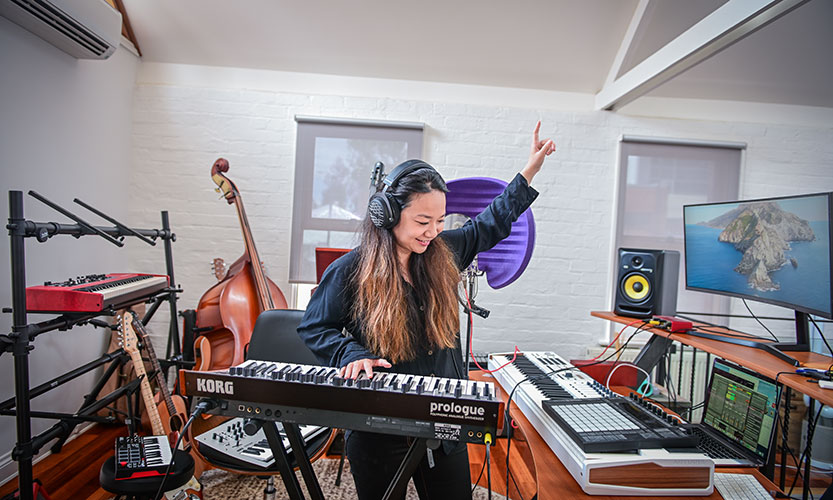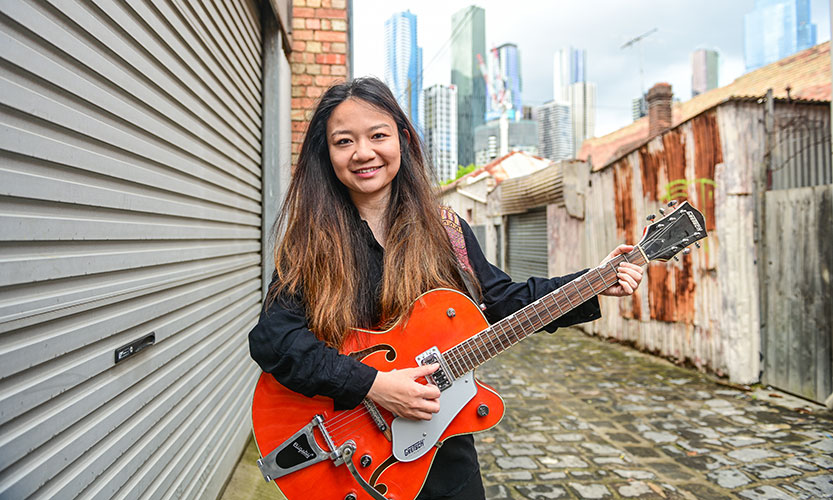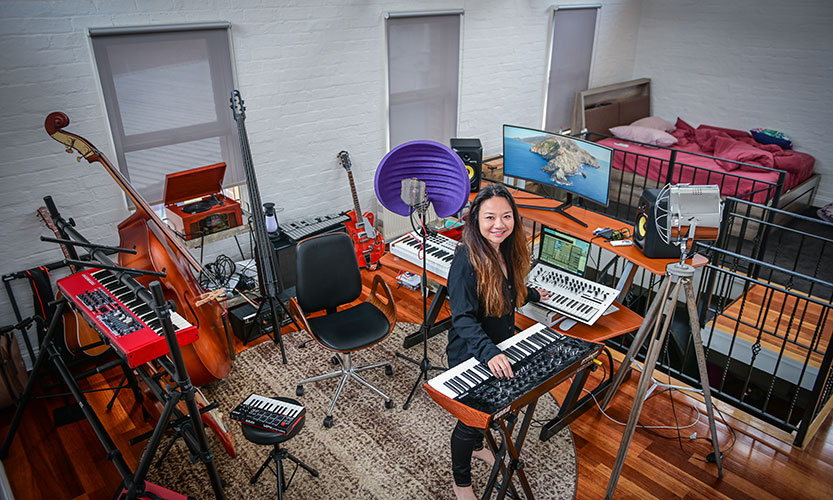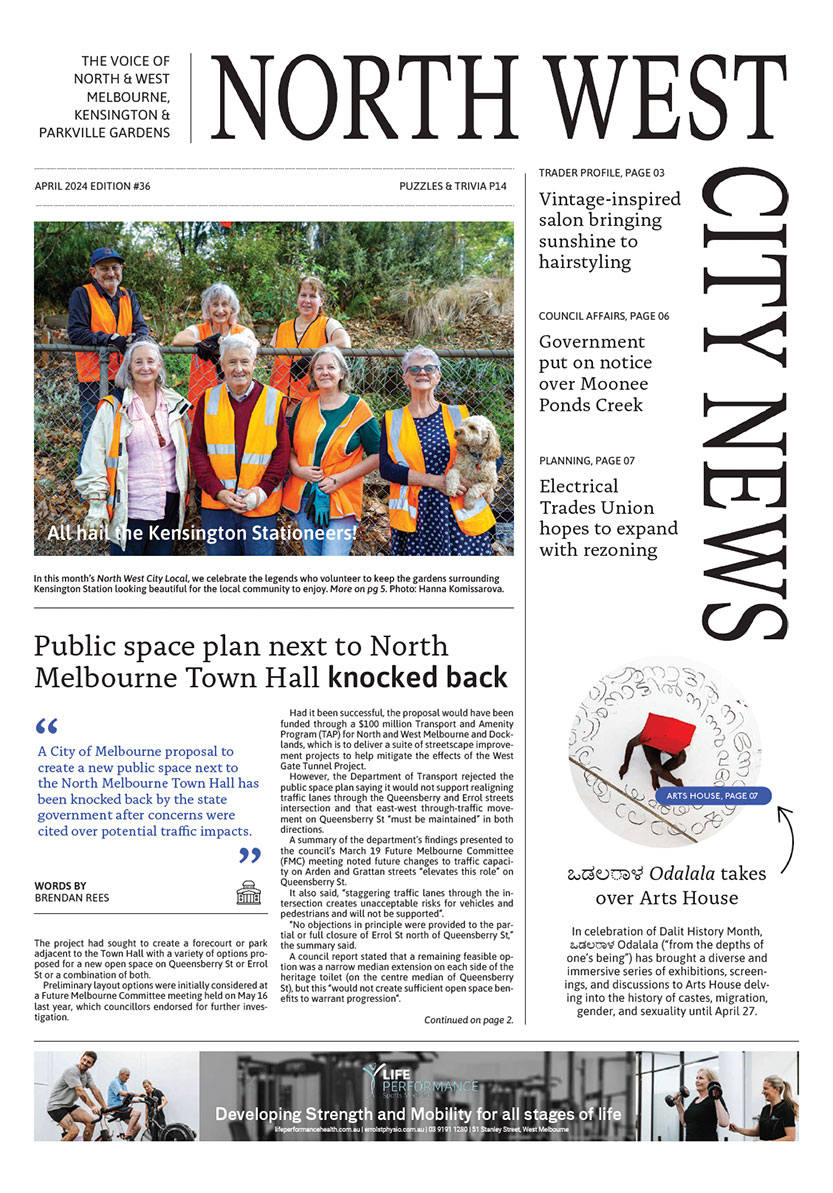Michelle’s world of music and medicine
Music and medicine may seem like disparate disciplines, but Dr Michelle Chong manages to excel in both while keeping the two quite separate.
When this local physician musician isn’t busy working as an anaesthetist at two major public hospitals, you’ll find her singing, playing keys, and producing down-tempo, electronica music from her DIY home studio in West Melbourne.
And now, after years of honing her skills, Dr Chong has released her fourth single, Mindspin, under her artist name, Echolily – a catchy, electronic dance song which she wrote after a night out on the town with her girlfriends who were all going through breakups.
But while she’s been keeping busy in Melbourne, like many of us, she has sadly missed being there for some important life moments due to COVID travel restrictions – namely the death of her father, and her sister’s marriage and pregnancy.
Born in Malaysia, Dr Chong was raised by her single mother who inadvertently kick-started her passion for music by buying her a radio cassette player as a kid.
Although they didn’t have much in the way of possessions growing up, Dr Chong remembers listening to cassettes of artists such as Witney Houston and the Sound of Music soundtrack, while her mother also tuned in to teach herself English.
“I was kind of broke when I was young and didn’t have many toys,” she said.
“My mother brought home this radio and I remember playing casettes every day and trying to copy them to learn how words were being put together to convey things like love.”
Wherever Dr Chong goes, music seems to follow.
When she was 18 years old, Dr Chong moved from her hometown to Kuala Lumpur to study medicine.
But when she didn’t have her head in the books, she was out exploring the “massive” jazz scene in the city, also getting lessons from the famous Malaysian singer Junji Delfino.
Already an adept singer and piano player, Dr Chong took up the double bass for a six-month stint when she first arrived in Melbourne to work as a doctor.
But she said it was the “toughest instrument” she had ever learnt.
“It doesn’t have any frets and it’s a lot do with listening to what the other people are playing and trying to lay the bass down – it’s lots of responsibility!” she said.
The irony of someone who uses chemical cocktails to render people unconscious without killing them for a living saying that double bass is a “big responsibility” was not lost on this publication.
Dr Chong’s first song, Under the Clocks was released in February this year on St Valentine’s Day. It’s a lo-fi banger with soaring synths and echoing, harmonic vocals punctuated by samples of sounds from Flinders Street Station.
“It was essentially a love letter to Melbourne,” she said.
When she first arrived in the city, Dr Chong said she loved listening to the sounds of the clocks and trains at Flinders Street.
“One day I was busking there, and there was a trumpet player, and he started telling me about the clocks and said people used to say: ‘meet me under the clocks’ as a way of communicating times and dates for dating, so I turned that into a song,” she said.
Having been a healthcare worker throughout the entire pandemic, Dr Chong said she was one of the few people who was permitted to leave the house – a lonely experience she tried to capture in the song.
“I could hear my own thoughts and the sounds of the clocks, and the song was internally produced to echo that sense of emptiness and the sounds echo and bounce off each other,” she said.
Throughout COVID, Dr Chong said she, and every medical professional she knew, threw themselves out onto the frontline with the instinct to protect and treat patients.
She said because anaesthetists often managed the airways of very sick patients, the pressure fell on her and her colleagues to treat people infected with COVID-19.
“A lot of the stress was in the unknown,” she said.
“There’s an expectation for the medical and science people to be the ones that the world community is looking for answers from, when we are also learning about the disease as well.”
Dr Chong said she was never afraid of catching COVID-19 herself, but she feared for her mum, stepdad and grandma back home in Malaysia where the effects of the pandemic were felt severely.
Dr Chong sadly lost her biological father to stroke last year but was unable to travel back to Malaysia with her brother who lives in Sydney.
“My younger sister had married and is having a baby soon, and I still haven’t been able to congratulate her [in-person] – I’m sure many people have this situation,” she said.
While juggling her twin jobs at two public hospitals in Melbourne where she’s often on-call day and night, Dr Chong wrote her second song, Blue.
“It was this really difficult time for me creatively, I had the worst writer’s block sitting in my bedroom studio just staring into my microphone, which by the way is blue!” she said.
“I thought I’ll write a song about my microphone.”
And then, at the end of the writer’s block, there was this really cool feeling of something breaking and there was this explosion of ideas.
“Blue is about what’s at the end of the writer’s block – the explosion of ideas, chords, synths.”
Three years ago, Dr Chong built her own music studio at home complete with speakers, Logic Pro, an audio interface, synthesisers, and mini keyboard.
Although she is a solo artist, she said she felt extremely connected with Melbourne’s music community, which had helped her through friendship and support when she’d needed help with a song.
She wished to give credit to Michael Cooper, a keyboardist and producer who Dr Chong said taught her “everything” she knew when it came to synths, as well as Andrew Beveridge, her guitar teacher.
Asked whether she ever thought about music at work, Dr Chong said she maintained two very separate worlds.
“Usually at work it’s non-stop and I focus on being a doctor,” she said.
“It’s a different side to me. I can split the two different worlds – the only limiting factor is time.”
Dr Chong said the idea for her most recent song, Mindspin, came to her while on a night out with her girlfriends after “a lot” of wine when they were all going through processes of breakups.
“The song includes my observations of how people handle different stages of being drunk and breakups,” she said.
“If you listen to the lyrics, it’s different mumbles and rumblings about love and how people made you feel.”
“I had the idea while I was out and went home and just smashed it out until morning, had a nap, then woke up and called it Mindspin.”
Aside from music and medicine, Dr Chong has been enjoying the end of lockdown, catching up with friends and venturing out to cafes and restaurants in North and West Melbourne.
She said she had recently had her friends over for drinks, but one of them left a lemon behind.
A few days later, she noticed an unpleasant smell emanating from behind the couch and found the lemon in a state of decomposition.
“Even though it smelt bad, it was still nice to be in a position to be able to have friends over who could leave lemons behind!” she said.
In the past, Dr Chong has had her songs played on ABC Radio, SBS Radio, as well as the Community Radio Network.
She said from here, her plan was to eventually release an album.
“But releasing a song at a time I’ve realised is a better way to release music. Trying to get people to connect with a song rather than an album of 10 songs is easier,” she said.
“Songs are like your children; you want each child to have the same amount of attention.” •

Jo Ryan unveils Ordered Chaos at Blender Studios








 Download the Latest Edition
Download the Latest Edition